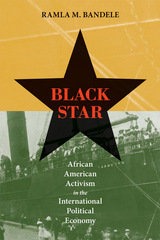
This book describes how the first African American mass political organization was able to gain support from throughout the African diaspora to finance the Black Star Line, a black merchant marine that would form the basis of an enclave economy after World War I. Ramla M. Bandele explores the concept of diaspora itself and how it has been applied to the study of émigré and other ethnic networks.
In characterizing the historical and political context of the Black Star Line, Bandele analyzes the international political economy during 1919-25 and considers the black politics of the era, focusing particularly on Marcus Garvey's Universal Negro Improvement Association for its creation of the Black Star Line. She offers an in-depth case study of the Black Star Line as an instance of the African diaspora attempting to link communities and carry out a transnational political and economic project. Arguing that ethnic networks can be legitimate actors in international politics and economics, Bandele also suggests, however, that activists in any given diaspora do not always function as a unit.
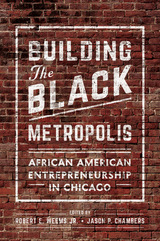
Contributors: Jason P. Chambers, Marcia Chatelain, Will Cooley, Robert Howard, Christopher Robert Reed, Myiti Sengstacke Rice, Clovis E. Semmes, Juliet E. K. Walker, and Robert E. Weems Jr.
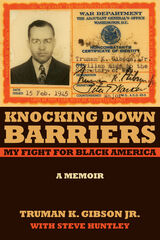
Recipient, 2007 Hyde Park Historical Society Paul Cornell Award
Knocking Down Barriers is the memoir of a life spent making a difference. In 1940, when Truman Gibson reported for duty at the War Department, Washington was like a southern city in its seemingly unalterable segregation and oppressive summer heat. Gibson had no illusions about the nation’s racism, but as a Chicagoan who’d enjoyed the best of the vibrant Black culture of prewar America, he was shocked to find the worst of the Jim Crow South in the capital. What Gibson accomplished as an advocate for African American soldiers—first as a lawyer working for the secretary of war, then as a member of Harry S. Truman’s “Black cabinet”—fueled the struggle for civil rights in the American military.
A University of Chicago Law School graduate, Gibson took his fight for racial justice to the corridors of power, arguing against restrictive real estate covenants before the US Supreme Court, opposing such iconic military figures as Generals Dwight D. Eisenhower and George C. Marshall to demand the integration of the armed forces, and challenging white control of professional sports by creating a boxing empire that made television history. Filled with firsthand details and little-known stories about key advancements in race relations in the worlds of law, the military, sports, and entertainment, Gibson’s memoir is also an engaging recollection of encounters with the likes of Thurgood Marshall, W. E. B. Du Bois, Eleanor Roosevelt, George Patton, Jackie Robinson, and Joe Louis. Winner of the 2006 Illinois State Historical Society Book Award Certificate of Excellence, Knocking Down Barriers illuminates social milestones that continue to shape race in the United States today.
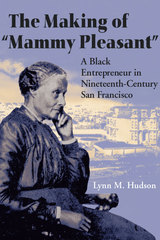
Investigating Mary Ellen Pleasant's convoluted legacy
Mary Ellen Pleasant arrived in Gold Rush-era San Francisco a free black woman with abolitionist convictions and a predilection for entrepreneurial success. Behind the convenient and trusted disguise of "Mammy," she transformed domestic labor into enterprise, amassed remarkable real estate, wealth, and power, and gained notoriety for her work in fighting Jim Crow.
Pleasant's legacy is steeped in scandals and lore. Was she a voodoo queen who traded in sexual secrets? A madam? A murderer? In The Making of "Mammy Pleasant," Lynn M. Hudson examines the folklore of Pleasant's real and imagined powers. Emphasizing the significance of her life in the context of how it has been interpreted or ignored in the larger trends of American history, Hudson integrates fact and speculation culled from periodicals, court cases, diaries, letters, Pleasant's interviews with the San Francisco press, and various biographical and fictional accounts.
Addressing the lack of a historical record of black women's lives, the author argues that the silences and mysteries of Pleasant's past, whether never recorded or intentionally omitted, reveal as much about her life as what has been documented. Through Pleasant's life, Hudson also interrogates the constructions of race, gender, and sexuality during the formative years of California's economy and challenges popular mythology about the liberatory sexual culture of the American West.
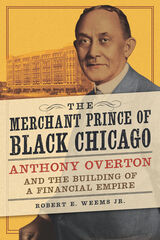
Robert E. Weems Jr. restores Overton to his rightful place in American business history. Dispelling stubborn myths, he traces Overton's rise from mentorship by Booker T. Washington, through early failures, to a fateful move to Chicago in 1911. There, Overton started a popular magazine aimed at African American women that helped him dramatically grow his cosmetics firm. Overton went on to become the first African American to head a major business conglomerate, only to lose significant parts of his businesses—and his public persona as ”the merchant prince of his race”—in the Depression, before rebounding once again in the early 1940s.
Revealing and panoramic, The Merchant Prince of Black Chicago weaves the fascinating life story of an African American trailblazer through the eventful history of his times.
READERS
Browse our collection.
PUBLISHERS
See BiblioVault's publisher services.
STUDENT SERVICES
Files for college accessibility offices.
UChicago Accessibility Resources
home | accessibility | search | about | contact us
BiblioVault ® 2001 - 2024
The University of Chicago Press









